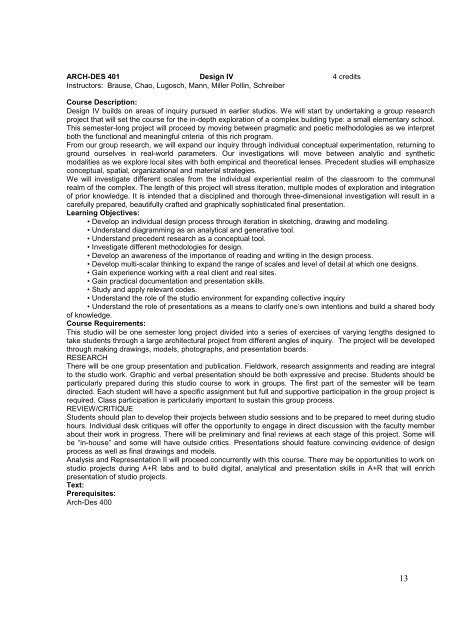architecture program report - University of Massachusetts Amherst
architecture program report - University of Massachusetts Amherst
architecture program report - University of Massachusetts Amherst
Create successful ePaper yourself
Turn your PDF publications into a flip-book with our unique Google optimized e-Paper software.
ARCH-DES 401 Design IV 4 credits<br />
Instructors: Brause, Chao, Lugosch, Mann, Miller Pollin, Schreiber<br />
Course Description:<br />
Design IV builds on areas <strong>of</strong> inquiry pursued in earlier studios. We will start by undertaking a group research<br />
project that will set the course for the in-depth exploration <strong>of</strong> a complex building type: a small elementary school.<br />
This semester-long project will proceed by moving between pragmatic and poetic methodologies as we interpret<br />
both the functional and meaningful criteria <strong>of</strong> this rich <strong>program</strong>.<br />
From our group research, we will expand our inquiry through individual conceptual experimentation, returning to<br />
ground ourselves in real-world parameters. Our investigations will move between analytic and synthetic<br />
modalities as we explore local sites with both empirical and theoretical lenses. Precedent studies will emphasize<br />
conceptual, spatial, organizational and material strategies.<br />
We will investigate different scales from the individual experiential realm <strong>of</strong> the classroom to the communal<br />
realm <strong>of</strong> the complex. The length <strong>of</strong> this project will stress iteration, multiple modes <strong>of</strong> exploration and integration<br />
<strong>of</strong> prior knowledge. It is intended that a disciplined and thorough three-dimensional investigation will result in a<br />
carefully prepared, beautifully crafted and graphically sophisticated final presentation.<br />
Learning Objectives:<br />
• Develop an individual design process through iteration in sketching, drawing and modeling.<br />
• Understand diagramming as an analytical and generative tool.<br />
• Understand precedent research as a conceptual tool.<br />
• Investigate different methodologies for design.<br />
• Develop an awareness <strong>of</strong> the importance <strong>of</strong> reading and writing in the design process.<br />
• Develop multi-scalar thinking to expand the range <strong>of</strong> scales and level <strong>of</strong> detail at which one designs.<br />
• Gain experience working with a real client and real sites.<br />
• Gain practical documentation and presentation skills.<br />
• Study and apply relevant codes.<br />
• Understand the role <strong>of</strong> the studio environment for expanding collective inquiry<br />
• Understand the role <strong>of</strong> presentations as a means to clarify one’s own intentions and build a shared body<br />
<strong>of</strong> knowledge.<br />
Course Requirements:<br />
This studio will be one semester long project divided into a series <strong>of</strong> exercises <strong>of</strong> varying lengths designed to<br />
take students through a large architectural project from different angles <strong>of</strong> inquiry. The project will be developed<br />
through making drawings, models, photographs, and presentation boards.<br />
RESEARCH<br />
There will be one group presentation and publication. Fieldwork, research assignments and reading are integral<br />
to the studio work. Graphic and verbal presentation should be both expressive and precise. Students should be<br />
particularly prepared during this studio course to work in groups. The first part <strong>of</strong> the semester will be team<br />
directed. Each student will have a specific assignment but full and supportive participation in the group project is<br />
required. Class participation is particularly important to sustain this group process.<br />
REVIEW/CRITIQUE<br />
Students should plan to develop their projects between studio sessions and to be prepared to meet during studio<br />
hours. Individual desk critiques will <strong>of</strong>fer the opportunity to engage in direct discussion with the faculty member<br />
about their work in progress. There will be preliminary and final reviews at each stage <strong>of</strong> this project. Some will<br />
be “in-house” and some will have outside critics. Presentations should feature convincing evidence <strong>of</strong> design<br />
process as well as final drawings and models.<br />
Analysis and Representation II will proceed concurrently with this course. There may be opportunities to work on<br />
studio projects during A+R labs and to build digital, analytical and presentation skills in A+R that will enrich<br />
presentation <strong>of</strong> studio projects.<br />
Text:<br />
Prerequisites:<br />
Arch-Des 400<br />
13

















